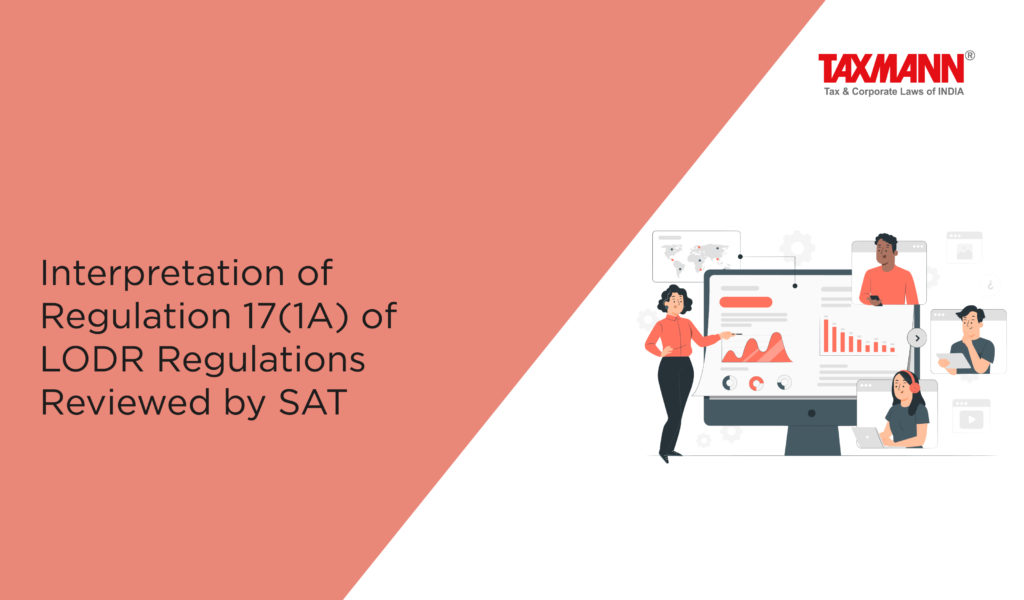Interpretation of Regulation 17(1A) of LODR Regulations Reviewed by SAT
- Blog|News|Company Law|
- 2 Min Read
- By Taxmann
- |
- Last Updated on 26 July, 2023

Case Details: Nectar Life Sciences Ltd. v. Securities and Exchange Board of India - [2023] 152 taxmann.com 201 (SAT-Mumbai)
Judiciary and Counsel Details
-
- Justice Tarun Agarwala, Presiding Officer & Ms Meera Swarup, Technical Member
- Anand Kankani, PCS & Ms Muskan Mubarakali Kadiwar, Adv. for the Appellant.
- Ravishekhar Pandey, Nishit Dhruva, Ms Shefali Shankar, Ms Rasika Ghate, Advs., Gaurav Joshi, Sr. Adv., Krushi N. Barfiwala & Shlok Bodas, Advs. for the Respondent.
Facts of the Case
In the instant case, one ‘SS’ was a non-executive independent director in company and unfortunately died resulting in a casual vacancy in board of directors. Later, on recommendation of nomination and remuneration committee of company, board of directors in meeting resolved casual vacancy in office of independent director by appointing ‘ASD’ as an additional independent director.
At that time age of ‘ASD’ was 75 years and 9 months. Under Companies Act, casual vacancy can be filled up by board of director but same was required to be approved by shareholders of Company within a stipulated period. However, before such resolution could be passed by general body of company, ‘ASD’ resigned.
The NSE issued a notice regarding non-compliance of LODR Regulations and directed appellant to pay fine on ground that Regulation 17(1A) of LODR Regulation is mandatory and no person can be appointed as a Non-Executive Independent Director, who is more than 75 years of age, unless a special resolution is passed by shareholders of company.
It was noted that regulation 17(1A) cannot be read in isolation and it is to be read harmoniously with provisions of section 152, 161 (4) of 2013 Act read with rule 4 of 2014 Rules and Regulation 17(1C) of LODR Regulations.
It makes clear that even if a person above age of 75 years is appointed by board of directors to fill up a casual vacancy, such appointment is required to be approved subsequently within prescribed period by a special resolution in next general meeting by members of company.
Further that, word ‘unless’ depicted in regulation 17(1A) does not mean ‘prior approval’ nor requirement of passing a special resolution is a qualificatory condition for appointment of a person as a director.
SAT Held
Thus, in view of aforesaid, the SAT observed that the finding of respondent that no persons could be appointed or continued to be appointed as a Non-Executive Director unless prior approval of shareholders was made was erroneous.
The SAT held that the impugned order could not be sustained and no penalty could have been imposed for violation of Regulation 17(1A) of LODR Regulations.
Disclaimer: The content/information published on the website is only for general information of the user and shall not be construed as legal advice. While the Taxmann has exercised reasonable efforts to ensure the veracity of information/content published, Taxmann shall be under no liability in any manner whatsoever for incorrect information, if any.

Taxmann Publications has a dedicated in-house Research & Editorial Team. This team consists of a team of Chartered Accountants, Company Secretaries, and Lawyers. This team works under the guidance and supervision of editor-in-chief Mr Rakesh Bhargava.
The Research and Editorial Team is responsible for developing reliable and accurate content for the readers. The team follows the six-sigma approach to achieve the benchmark of zero error in its publications and research platforms. The team ensures that the following publication guidelines are thoroughly followed while developing the content:
- The statutory material is obtained only from the authorized and reliable sources
- All the latest developments in the judicial and legislative fields are covered
- Prepare the analytical write-ups on current, controversial, and important issues to help the readers to understand the concept and its implications
- Every content published by Taxmann is complete, accurate and lucid
- All evidence-based statements are supported with proper reference to Section, Circular No., Notification No. or citations
- The golden rules of grammar, style and consistency are thoroughly followed
- Font and size that’s easy to read and remain consistent across all imprint and digital publications are applied



 CA | CS | CMA
CA | CS | CMA
